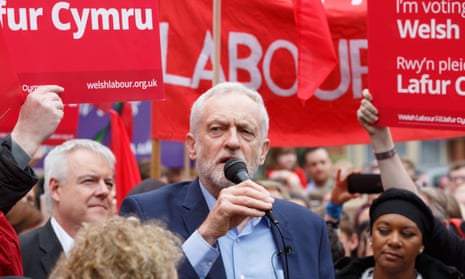Two elections are being fought this month. Let’s call the first the official election. It’s the one you watch on the television, read about in the papers, see as a meme on Facebook. It’s the kind that leaps on the weekend’s local polling and proclaims it a disaster for Jeremy Corbyn. That serves up a hot take on any policy, no matter how trivial (four more bank holidays) or unachievable (getting net migration down to the tens of thousands in the next five years). That peers at Emmanuel Macron’s televised rallies and asks plaintively: “Why can’t he be Labour leader?”
Then there’s the one you don’t hear much about. The one where those clever points made on the blessed Today programme mean diddly squat. Where, after three years of Big National Votes, the public aren’t so much apathetic as sullen. The one where the problems for Labour go far wider and deeper than one bloke and his fondness for Karl Marx. The one that raises big questions about the prospects for British democracy.
Where the two elections collide is in places such as Bridgend, just outside Cardiff. A seat that has been Labour almost since it was created is now so likely to go blue that Theresa May popped in a few days ago for a pre-victory lap. Nor is it alone: polling this week by Roger Scully at Cardiff University puts the Conservatives at their highest rating ever. Scully called Brexit right, and by his projections, May’s party is well on course to win the general election in Wales.
Think about that. No part of the UK has been more faithful to Labour than Wales. The party has won almost every general election in nearly 100 years. In the south Welsh valleys, “Tory” is less of an affiliation than an insult. Now all that stands to be upended – in a result that will drive political columnists to file obits for Corbyn. But spend some time in Bridgend, as I did just after May’s flying visit, reporting for the Guardian and making a film for Vice News, and a more complex and worrying picture emerges.
First, this is not an election that the Conservatives are winning, it’s one Labour is losing. In Bridgend, I never once spotted a blue placard or poster. There wasn’t even a Tory candidate, until late last week, when central office imposed its own woman against the wishes of the local association. All this reminds me of visiting south Wales before last year’s Brexit vote, and realising that the ground game for Vote Leave was mainly a bunch of teenagers – one of whom was about to sit his GCSEs.
What’s affecting the Labour vote? The truth is, it’s been sliding for years in Bridgend, and leadership is only a small part of the reason why. Party diehards will say almost unanimously that they like Corbyn “and his ideas”, but the most telling comment I heard was from Ben, a thirtysomething who worked at the local Ford plant. He reeled off the Labour leaders he’d lived under: Blair, Brown, Miliband, Corbyn. “These people couldn’t be further from what I am. They don’t represent me.” He saw the divide not as ideological but cultural. Never mind the nuances in policy, what he heard was the same breed of professional politician. And while his dad and granddad had “always voted Labour”, he wouldn’t.
You hear versions of that story all over south Wales. An entire region has now lost the habit of voting Labour – even if there isn’t an obvious alternative, like the Scots now have with the SNP. For some, the break came during the Brexit battles when Ukip started scooping up seats in the Cardiff assembly. A family that previously always been red went purple and are now going blue, as May morphs into Nigel Farage, complete with promises to slash immigration (which plays brilliantly in an area almost completely white British).
But that on its own doesn’t explain it. Hang around long enough, keep an eye on that second election, and it becomes clear that what you’re seeing is the strange death of Labour Wales – one that goes back further and deeper than June 2016.
In its heartlands, Labour was always a working-class party, and what’s changed is that the working class has been smashed up. The physical traces of that are evident all over south Wales. The mines are now museum pieces. The Sony factory in Bridgend has long since gone, while the town’s Ford plant is reportedly preparing to shed over half its workers. What’s replaced those careers? A scan of the windows of the recruitment agencies tells you: fork-lift drivers, warehouse staff, “recycling operatives”. All at around minimum wage, and hardly any full-time.
For decades, Labour took this area and its other heartlands for granted – while it flirted with Mondeo Man and Worcester Woman. It parachuted in its plastic professional politicians – just think of the way Tristram Hunt was airlifted into Stoke – and ignored the need to nurture local talent. Now in Wales and elsewhere, it is paying the price of decades of ingrained arrogance.
Margaret Thatcher’s economics have achieved her political objectives: they have reduced the civil society that supported Labour to quaint pieces of heritage. Bridgend’s Labour social club shut down years ago. The trade unions are shadows of themselves. Meanwhile the local papers are little more than listicles (among the top stories on Wales Online yesterday: “These are the takeaways in Wales with zero hygiene ratings”.
Few other parts of Britain rival south Wales for its sense of economic tragedy: the area that gave the world the first iron rails, exploited for its mineral wealth and then rendered surplus to the requirements of capital. We talk of people thrown on the scrapheap; here’s an entire tranche of the UK now post-growth and post-democracy.
None of this will feature in the first election of course: that will be about the Labour leadership, with smooth-cheeked technocrats calling for more professionalism, greater patriotism and all those 90s watchwords. But this second election is really about the bedrock of Labour’s vote in south Wales and many other places that are tuning out politics altogether, because the party they’ve voted for just hasn’t offered them much for decades.
Under Blair and Brown, the UK’s richest households – concentrated in London and the south-east – took an even greater share of national income than they did under Thatcher. Under the devolved Labour administration in Cardiff, hundreds of millions were thrown at the likes of LG, Amazon and Ford for jobs that have either gone or are now going. For all his leftwing rhetoric, Corbyn doesn’t offer much more than the same failed Keynesianism.
Labour in Wales and elsewhere grew out of social institutions. Now they’ve been razed almost to the ground, it needs to turn itself into a social institution. It should be providing welfare rights advice to those whose benefits are being cut, legal support to tenants battling greedy landlords and arguing with the utilities to provide cheaper and better deals. None of this is easy. None of this makes good copy. But it’s essential if the party is to survive.

